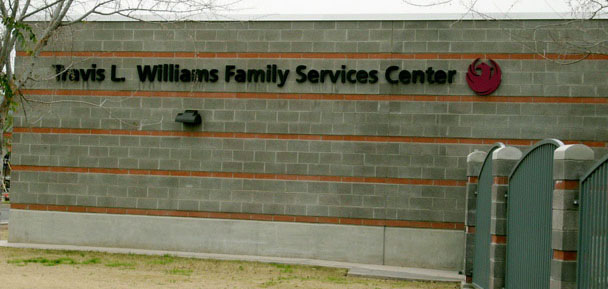|
|
|
| Chris Brown's Project Pages
|
Family Services in South Phoenix By Chris Brown South Phoenix is an urban area where many live in desperate need of help. From food and clothing to finding a job and paying utilities, many services find a welcome home in the area. One agency that provides such help is the Travis L. Williams Family Services Center, part of the City of Phoenix Human Services Department, Community Services Division.
Stopping in to the center one day for some quick information, our group received an informal and informative tour of the facility, discovering how it provides many of the services people in South Phoenix need. Emergency financial assistance is available to help residents in immediate need of money for rent or utilities, among other financial obligations. Emergency food boxes are also available, allowing easy and appropriate distribution of food to those in need. Other services include a “Headstart” program, a pre-school program designed for young children who cannot otherwise afford pre-school. The most comprehensive service available at the center is a case management service. People who find themselves unable to deal with significant problems in their life can find wonderful help on an individual basis. This program recognizes the uniqueness of every case, and the personal attention many people need to step into their lives. The Travis L. Williams Family Service Center is a marvelous facility. The newly designed and built center looks modern and clean, a bright spot among often run-down buildings. Through a tour of the facility, it was evident how practical and helpful it was designed to be. A computer room allows clients to search for job postings and create computerized materials, and meeting rooms play host to a wide range of groups, including many that focus on teaching family skills such as fathering. In a fairly poor area of Phoenix a place such as this is both badly needed and welcome. Unfortunately, not everything is going according to plan. According to an article in the Arizona Republic in December of 2002, written by Yvonne Wingett, many of the City of Phoenix’s family service centers are running in “crisis mode.” Apparently, low funding levels creating a lack of sufficient staffing and service availability have created a lack of available time for clients. As a result, the centers have stopped taking appointments in advance in an attempt to serve clients more fairly. Previously, clients would have to wait weeks to receive services that might be very important, such as financial aid or help finding a job. Even now, the crunch on time and money is being felt at the Travis L. Williams Family Services Center. One important aspect of any discussion of badly needed services in poor areas of American cities is that of the historical processes that create the demand for such services. Douglass Massey and Nancy Denton approach this issue in “American Apartheid: Segregation and the Making of the Underclass.” Early in the work, on page two, the authors state that “because of racial segregation, a significant share of black America is condemned to experience a social environment where poverty and joblessness are the norm.” This discussion of racial segregation, easily extended to the historic ethnic divisions of Phoenix that have created a largely Hispanic and black South Phoenix, can help to explain why the Travis L. Williams Family Services Center is needed. It also helps to present possible solutions to the problems. Perhaps instead of treating symptoms such as joblessness and poverty we should be addressing the social inequalities, made all the worse by special segregation, that cause poor neighborhoods across the country to be created and perpetuated. In a speedily changing area like South Phoenix, with a history of poverty and family trouble, services such as those provided by this center are sorely needed. It is a shame that the city of Phoenix has needed to cut funds from family service centers. Perhaps in the future, people in America will commit themselves to social programs that benefit the entire country, putting the health and welfare of others, and as a nation as a whole, before their own. Perhaps we will even try to solve underlying problems such as social inequality and segregation that create the need for such social services as we have discussed in this paper. Until such a time, it is important to learn from the services we do have, and to continue to fight for their funding and implementation.
|

